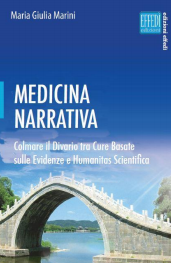 The book “Narrative Medicine: bridging the gap between evidence based care and medical humanities” will be published in Italian in July under the title “Medicina Narrativa: colmare il divario tra Cura Basata sulle Evidenze e Humanitas Scientifica” by Casa Editrice Fischio d’Inizio.
The book “Narrative Medicine: bridging the gap between evidence based care and medical humanities” will be published in Italian in July under the title “Medicina Narrativa: colmare il divario tra Cura Basata sulle Evidenze e Humanitas Scientifica” by Casa Editrice Fischio d’Inizio.
The translation will be edited by Roberta Invernizzi, participant of ISTUD’s Master in Narrative Medicine and, in addition, a person who has asked herself a precious question: why are the most important books on Narrative Medicine and Medical Humanities mainly in English and not available in Italian? First of all, I would like to say that my book written in English is certainly not among the most important: I am thinking of other books that have inspired, older, such as that of Rita Charon, Honouring the stories of illness, or Byron Good who told us about the different ways of conceiving health according to the cultural context of origin.
Secondly, it is true that English is a price to pay if you want to remain on the international scene, and more, to make known the thought “made in Italy” abroad. I also liked him writing in another language, very rich in neologisms and drier in its structure. But now, thanks to Fischio d’inizio, a Piedmontese publishing house to which Springer has ceded the rights to the book, this text will be available in Italian also for the request of many people who for two years have continued to ask … but when does the translation come out? I am also interested in communicating the editorial idea of Fischio d’Inizio, which has taken up Roberta Invernizzi’s proposal and which therefore intends to publish in Italian the “cornerstone” books on narrative medicine: from Launer to Good to Charon…in relation to the agreements between the various international publishing houses.
The fact remains, however, that narrative medicine was not born with a recent person or a school, but in the classics you can already find the big questions and answers for the care.
